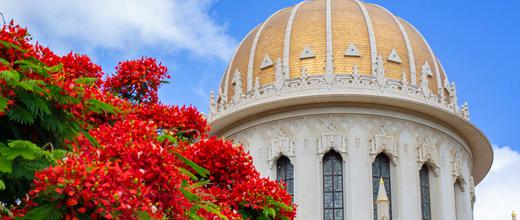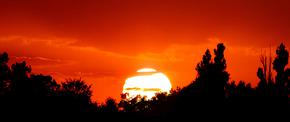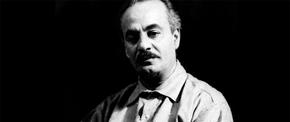The views expressed in our content reflect individual perspectives and do not represent the authoritative views of the Baha'i Faith.
Similar to religious traditions of the past, Baha’is view pilgrimage to the Baha’i holy sites and shrines as a privilege – and as a spiritual obligation:
O Son of Spirit! With the joyful tidings of light I hail thee: rejoice! To the court of holiness I summon thee; abide therein that thou mayest live in peace for evermore. – Baha’u’llah, The Hidden Words, p. 11.
This passage from Baha’u’llah sheds light on the significance of drawing nearer to him by visiting his shrine and resting place, which represents a sacred act of sacrifice and devotion:
The Lord hath ordained that those of you who are able shall make pilgrimage to the sacred House … – Baha’u’llah, The Most Holy Book, p. 32.
Today, thousands of Baha’is from diverse communities around the world make their pilgrimage to the Baha’i World Centre, located in Haifa, Israel. For 9 days, Baha’is visit to pray and meditate in the sacred shrines of Baha’u’llah and the Bab. Baha’is visit historical sites and see precious artifacts associated with the lives of the central figures of the Baha’i Faith. They also have the opportunity to meet the governing body of the international Baha’i community, The Universal House of Justice, and attend various presentations and talks.
Engaging in this act of worship in such sacred locations, surrounded by beautiful gardens amongst a diverse human family, can both enrich and transform. It serves as an opportunity to become closer to the central figures of the Baha’i Faith and its Institutions and engenders spiritual renewal and fellowship. Many feel that participating in a spiritual pilgrimage contributes to a revived dedication in one’s own services to the community upon returning home, as news and insights shared yield inspiration. The Universal House of Justice regards pilgrimage as one of the most holy Baha’i observances.
Baha’i pilgrimage dates back to the time of the Bab and Baha’u’llah, when they were banished by the kings and rulers of the Ottoman Empire in exile and imprisonment. Devoted followers would visit them in some of the most arduous and difficult circumstances. Travelling by foot, for months at a time, often through the desert heat or in below-freezing temperatures, with nothing but the clothes on their backs. These devoted followers, who wanted to catch a glimpse of their spiritual teacher and learn of their teachings first hand, were known as pilgrims. Once they had met or seen the Bab and Baha’u’llah, heard their revelation and been in their presence, they would return home and share their experiences with loyal followers who did not have the same opportunities to travel.
My father, Paul Toloui-Wallace, has been blessed many times, as he’s had the privilege to participate in four Baha’i pilgrimages throughout his life. His last pilgrimage was in 2017 following the Bicentenary celebration of the birth of Baha’u’llah. The Bicentenary was commemorated by millions around the world, through various events and artistic contributions that celebrated the life, personage and significance of Baha’u’llah. While on pilgrimage, my father met countless souls from all walks of life, from Myanmar, to Azerbaijan, to Germany. Many of his fellow pilgrims had saved for their whole lives to attend their first and possibly only pilgrimage. All shared news of their Bicentenary celebrations and community-building efforts back home. My father felt so humbled and inspired to be among such devoted souls.
Upon returning home, grateful for the opportunity to pray in the holy resting places of Baha’u’llah and the Bab, he reflected on the many pilgrims who would never have the same opportunities to visit the Baha’i shrines – and the devotion he witnessed in those pilgrims who did make it. He reflected on the sacrifices that many of them made to be there. He grew even more inspired by the stories of heroism of the central figures of the Baha’i Faith and shared them with his local Baha’i community.
Being the poet that he is, my father decided to channel his experiences as a pilgrim, and the admiration he has for the Bab, by honoring the bicentenary of the birth of the Bab, forerunner of the Baha’i Faith, celebrated around the world on October 29, 2019. For this highly auspicious bicentenary celebration, he wrote a poem titled Bring us the Flame.
When writing his poem, titled Bring us the Flame, Paul reflected deeply on the journeys of the Babi pilgrims in the 1840’s, and on how thousands of the Bab’s followers discovered his teachings. The absence of today’s technology and resources compounds the mystery about their spiritual journey and the spiritual forces that lead them to become ardent followers of the Bab. At that time, the only possible way such eager and devoted souls could hear news of the Bab was by word of mouth, through Babi pilgrims who shared stories and wrote letters of their conversations and experiences with the Bab.
Bring us the Flame tells the imagined story of humble villagers and devoted Babi’s who possess purity and spiritual insight, but are too poor to travel. These devoted souls yearn for guidance and spiritual sustenance from The Bab, who they have never met. By chance, they discover a Babi pilgrim traveling to visit the Bab during his banishment in the mountainous fortress of Mah-Ku. Not wishing to burden the pilgrim, they request that he bring them intangible items from the Bab’s presence, as they feel these abstract requests will guide their ways, bring joy to their hearts and sustain them spiritually:
God desireth not to see, in the [Babi] Dispensation … any soul deprived of joy and radiance. He indeed desireth that under all conditions, all may be adorned with such purity, both inwardly and outwardly, that no repugnance may be caused even to themselves, how much less unto others. – The Bab, Selections from the Writings of the Bab, p. 80.
My husband and I were so touched by this poem that we decided to put it to music in honor of the Bicentenary of the birth of the Bab.
Bring us the Flame
If you are a pilgrim
to the Bab in Mah-ku?
we’ve got a request
we must ask of you
we need precious things
you can’t see or touch
they’re easy to gather
and will move hearts so much
bring us the flame in his eyes
from the fire in his heart.
bring us the imprint
of his feet in the sand
so everyone knows just
how we should stand
bring us the mirror
that reveals his gaze
we want his reflection
to guide our ways
we need the flame in his eyes
from the fire in his heart.
bring us the holes
from his threadbare clothes
to clothe our own souls
from our head to our toes
bring us the sound
of his melodious voice
that endless echo,
our devoted choice
there’s just one thing
that we ask of you now
please wipe and keep
the sweat from his brow.
give us the flame x6
give us the flame in his eyes
from the fire in his heart.
if you are a pilgrim
to the Bab in Mah-ku?
we’ve got a request
we ask you to do

















Comments
Sign in or create an account
Continue with Facebookor